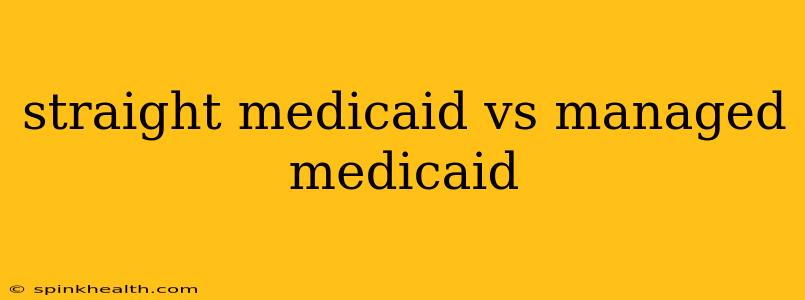Straight Medicaid vs. Managed Medicaid: Understanding the Differences
The world of healthcare can be confusing, and navigating the complexities of Medicaid is no exception. For many, the terms "straight Medicaid" and "managed Medicaid" seem interchangeable, but there are crucial differences that impact access to care and the overall experience. Let's unravel these distinctions through a story.
Imagine Sarah and Maria, both eligible for Medicaid in the same state. Sarah is enrolled in straight Medicaid, also known as fee-for-service Medicaid. Maria, on the other hand, is in a managed Medicaid plan. Their journeys to healthcare highlight the key differences between these two systems.
Sarah's Journey: Straight Medicaid (Fee-for-Service)
Sarah's experience is characterized by freedom of choice. With straight Medicaid, she can choose any doctor or hospital that accepts Medicaid. She isn't restricted to a specific network of providers. This offers flexibility, allowing her to select specialists and healthcare facilities based on personal preference, reviews, or proximity.
However, this freedom comes with a responsibility. Sarah needs to manage her own healthcare appointments, referrals, and claims processing. She is responsible for navigating the system and ensuring her bills are correctly submitted and reimbursed by Medicaid. This can be time-consuming and sometimes overwhelming, particularly if Sarah has complex medical needs or limited resources to manage paperwork.
Maria's Journey: Managed Medicaid
Maria's experience is quite different. She's enrolled in a managed Medicaid plan, meaning she receives her care through a private health insurance company contracted with the state Medicaid program. This company manages her healthcare access, often through a network of doctors and hospitals. Maria needs to choose a provider within this network. While this limits her choices, it also simplifies the process.
Her managed Medicaid plan coordinates her care, often managing referrals and authorizations for specialists. Claims are typically processed automatically, reducing administrative hassle for Maria. She also benefits from preventative care programs and coordinated care management, which can improve her overall health outcomes. However, if Maria needs a specialist outside her network, she might face higher costs or delays in receiving care.
Frequently Asked Questions (PAA)
Here are some common questions about straight Medicaid vs. managed Medicaid, addressed through the lens of Sarah and Maria's experiences:
What are the advantages of straight Medicaid?
Sarah appreciates the freedom of choice that straight Medicaid provides. She can choose any provider who accepts Medicaid, giving her more control over her healthcare decisions. This is particularly valuable for individuals who need specialized care or have strong preferences for specific doctors or hospitals.
What are the disadvantages of straight Medicaid?
The administrative burden is a significant disadvantage for Sarah. She's responsible for managing appointments, referrals, and claims processing, which can be a challenging task for someone with limited time or resources. The lack of coordinated care can also lead to fragmented care and potential gaps in her healthcare.
What are the advantages of managed Medicaid?
For Maria, the coordinated care and simplified claims processing are huge advantages. Her managed Medicaid plan handles many administrative tasks, making it easier for her to access necessary healthcare services. The emphasis on preventative care also improves her overall health.
What are the disadvantages of managed Medicaid?
Maria's choice of providers is limited to the network offered by her managed Medicaid plan. This could mean longer wait times for appointments with specialists or having to travel further to see a preferred doctor. She might also face limitations on accessing certain treatments or specialists outside her network.
Which type of Medicaid is better?
There's no single "better" option. The best type of Medicaid depends entirely on individual needs and preferences. Sarah might value the freedom of choice, even if it means extra administrative work. Maria prefers the simplicity and coordinated care of managed Medicaid, even with the network restrictions. The optimal choice hinges on factors like health status, access to transportation, comfort with administrative tasks, and personal preference.
Can I switch between straight Medicaid and managed Medicaid?
The ability to switch between plans often depends on state regulations and the availability of open enrollment periods. It is advisable to contact your state's Medicaid office to inquire about switching options and eligibility requirements. Some states might offer open enrollment periods annually, allowing eligible individuals to change plans.
This story of Sarah and Maria illustrates the core differences between straight and managed Medicaid. Understanding these distinctions empowers individuals to make informed choices about their healthcare access and management. Remember to consult with your state's Medicaid agency for details specific to your situation.

